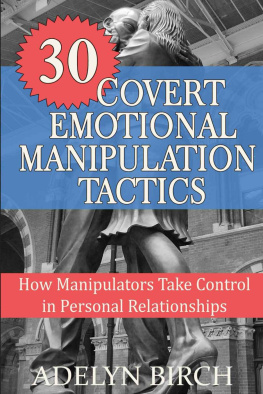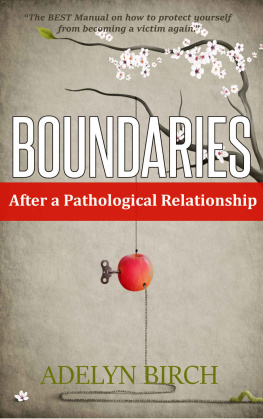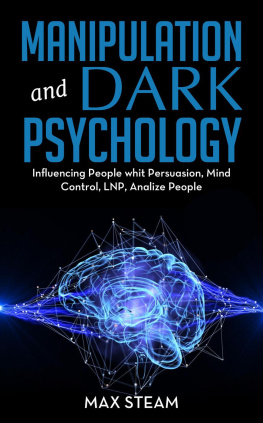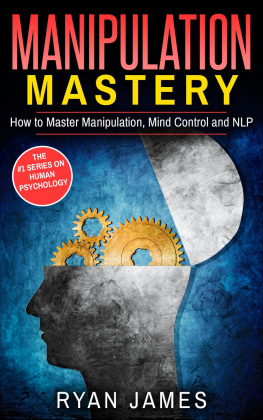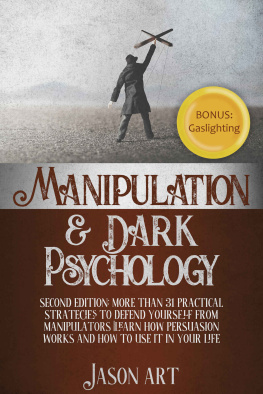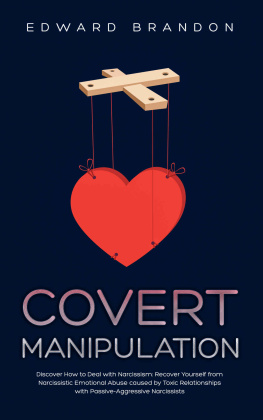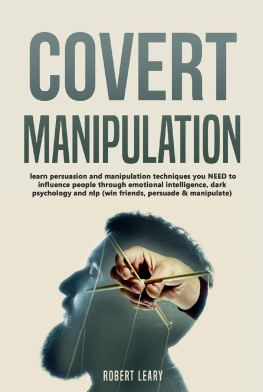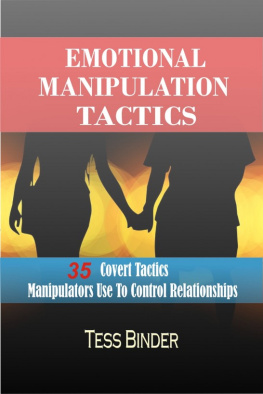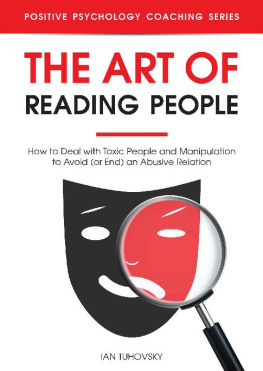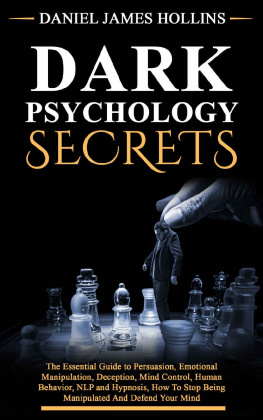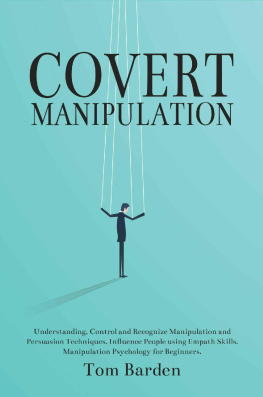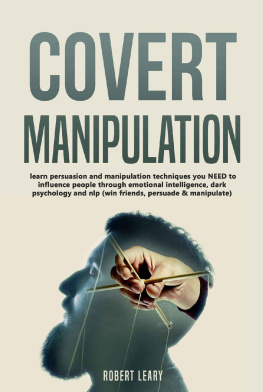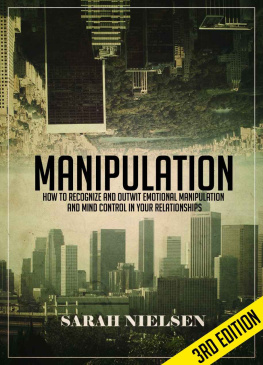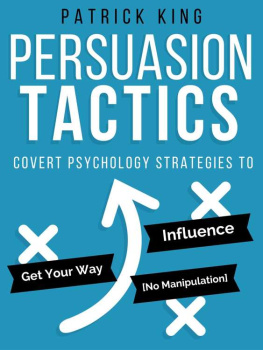All rights reserved. No parts of this publication may be reproduced, stored in a retrieval system or transmitted, in any form or by any means, electronic, mechanical, photocopying, recording or otherwise, without the prior permission of the author.
CHAPTER ONE:
WHAT IS COVERT EMOTIONAL MANIPULATION?
"Until you realize how easily it is for your mind to be manipulated, you remain the puppet of someone else's game."
~ Evita Ochel
Covert emotional manipulation tactics are underhanded methods of control. These deceptive tactics act to change your behavior and perceptions. Covert manipulation operates under the level of your conscious awareness. Victims usually do not realize they are being manipulated while it is happening. That is exactly why it is important to become aware of the methods manipulators use.
Who are these manipulative people?
The most skillful and dangerous manipulators are those included in psychology's "dark triad." Psychopathic, narcissistic and Machiavellian personalities lack empathy and manipulate in a planned and purposeful way for their own personal gain, no matter the cost to someone else. They are callous, insensitive, aggressive and opportunistic individuals who use others and act out against them to achieve their own ends. It is entirely possible to have a member of the dark triad as your partner, friend, neighbor, relative, coworker or boss. They attempt to hide who they really are by creating a seemingly normal, and often a charming and likeable, persona; but their malicious intent remains active behind the mask. These individuals are detrimental to the mental health of anyone who has close contact with them.
People without serious psychological disorders also use manipulation to get what they want, without malicious intent and sometimes without any awareness of what they are doing. It is said that we're all guilty of using manipulation on occasion instead of communicating our needs and desires in a direct way. There is a significant difference between someone who is a pathological manipulator and someone who uses manipulation to get what they want from time to time. Pathological manipulators have no other way to relate to others and nothing real to offer in a relationship, such as love and intimacy. There is no way to change them.
Manipulation undermines your ability to consciously make decisions and take actions in your own best interest, in accordance with your personal values and boundaries. In other words, manipulation gets you to do things you wouldn't otherwise do.
At its worse, emotional manipulation methodically wears down your self-worth and self-confidence and damages your trust in your own perceptions. It can make you unwittingly compromise yourself to the point of losing your self-respect and developing a warped concept of reality. With your defenses weakened or completely disarmed in this manner, you are left even more vulnerable to further manipulation.
A skilled emotional manipulator gets you to put your sense of self-worth and emotional well-being into his or her hands. Once you're tricked into making that grave mistake, they methodically chip away at your identity and wreak havoc on your psychological health.
In order to be successful, a purposeful and malicious manipulator must know your vulnerabilities, conceal their aggressive intentions and behavior, and be ruthless enough not to care what harm their manipulation causes you. Taking control and getting what they want are all that matters.
Becoming aware of the tactics manipulators use enables you to identify concealed aggression. But it is not always easy to do, because manipulators count on your trust, doubt and strong emotions guilt, fear, love and shame to prevent you from thinking clearly and seeing the manipulation. In many cases they manufacture these emotions purposely for that reason. That's how manipulators get away with what they do. Therefore, it is very important for you to recognize when you are doubting your own perceptions or intuition, or experiencing an emotion that makes you vulnerable to manipulation.
Although this book is focuses on romantic relationships, the manipulation tactics described are simply that, manipulation tactics. Many are the same methods employed by manipulative friends, family members, coworkers, bosses, neighbors and even children.
CHAPTER TWO:
HOW CAN YOU TELL IF YOURE BEING MANIPULATED? 19 SIGNS
Emotional manipulation can be so subtle and undercover that it can control you for a long time before you figure out what's happening, if you ever do at all. Some manipulators are highly skilled. They're described as puppet masters, and you could unknowingly become a puppet if you don't know the signs.
As your strings are pulled this way and that, you do just what the puppet master wants you to do. You think you're acting from your own free will, but you are not.
If you're a victim of manipulation you probably know something is wrong, but you're not quite sure what it is. You might even suspect you're being manipulated but you don't know for sure if you are or how it's being done. One thing you do know is that you want answers -- are you being manipulated or not? How can you tell?
Actually, it is easier and more obvious than you might think it is.
It's smart to learn the techniques of covert emotional manipulation, and you'll do just that in the next chapter. But the truth is you don't have to know anything at all about the techniques to know if you're being manipulated. You only need to look at yourself to know if manipulation is at play.
Manipulation is detrimental and has profound negative effects on us, even if we don't know it's happening. Those negative effects are the evidence left when the crime of manipulation has taken place.
If you are in a relationship and notice any of the following signs, there is a high probability you are being manipulated:
Your joy at finding love has turned into the fear of losing it. Your feelings have gone from happiness and euphoria to anxiety, sadness and even desperation.
Your mood depends entirely on the state of the relationship, and you are experiencing extreme highs and lows.
Youre unhappy in the relationship and uncertain about it much of the time, yet you dread losing it because you're blissfully happy every now and then.
You feel like you're responsible for ruining the best thing that ever happened to you, but you're not sure how.
Your relationship feels very complex, although you're don't know why. When talking to others about it, you might find yourself saying Its hard to explain. It's just really complicated."
You continually obsess about the relationship, analyzing every detail repeatedly in a desperate attempt to figure it out. You talk about it all the time to anyone who will listen. It doesn't do any good.
You never feel sure of where you stand with your partner, which leaves you in a perpetual state of uncertainty and anxiety.
You frequently ask your partner if something is wrong. It really does feel as if something's wrong, but you are not sure what it is.
You are frequently on the defensive. You feel misunderstood and have the need to explain and defend yourself.
You seem to have developed a problem with trust, jealousy, insecurity, anger or overreaction, which your partner has pointed out to you on many occasions.
You have become a detective. You scour the web for information about your partner, keep a close eye on his or her social media accounts, and feel a need to check their web search history, texts or emails. When they are not at home, you have a desire to verify their whereabouts as you worry about where they really are.

